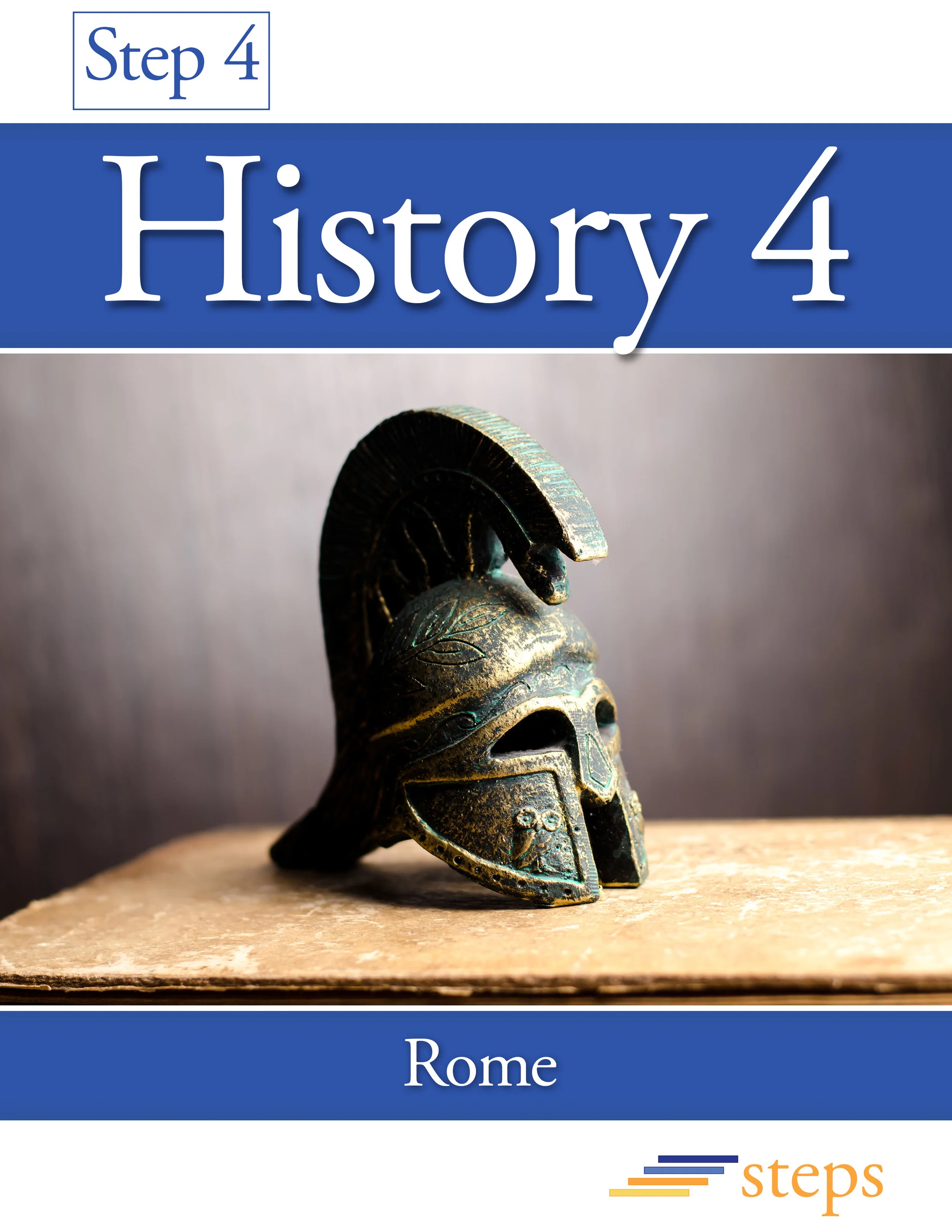Step 4 - History 4 - Rome
Step 4 - History 4 - Rome
- Develops literacy, vocabulary, geography, politics!
- Introduces & explores key ideas in history!
- Explores the lives of Jesus, Caesar, many others!
- Explores the empire's 1,000 year rule!
- Explores Roman art!
- Covers major people & events in the order they happened!
- Covers the history of both China and India, during the same period!
- Hands-on activities make history relevant to the student!
- Develops critical thinking skills!
- Develops study in a self-determined manner!
- Lesson plans are complete and ready to use! Start now!
We're currently working our way through this program and loving it. The children (aged 12 and 16) work independently on most of their subjects, but we chose to do this together to tie in with this year's Great Books studies. As we started with The Epic of Gilgamesh, the Mesopotamian start to this unit worked perfectly.
This program has been designed for independent study, but we've found it to be ideal for collaborative learning, encouraging interesting discussions. All the hard work has been done, but there is plenty of scope for shaping it to your family's needs. If necessary the children can work on their own too, so I love the freedom this gives us. Highly recommended. E. R., Professional Educator
_____
For history students ages 11-adult. Learn about the greatest and longest-lived empire the west has ever known! For 1,000 years, Rome dominated the known world, its military, roads, writings and politics conquering all in its reach. And in the midst of the Roman Empire, the rise of Christianity and the life of Christ is also covered in detail.
Our fourth Step 4 (ages 11-adult) History course brings to life the longest-lived empire in Western history. One of the greatest experiments in government and world rule are investigated. The lives of many of the most important figures in Western Civilization are studied. This extensive course provides a thorough overview not only to Rome, but to Christianity, and to the various forces which surrounded Rome during its 1,000 years as an Empire.
The lives and words of Caesar and Christ are studied. The great spokesmen of Rome such as Cicero, are read and considered. The Roman way of life, or war, of art and literature and architecture, are all studied. The dome, the aqueduct, the Forum and the Coliseum are examined and appreciated. Even works inspired by Roman History, such as Shakespeare's play Julius Caesar, are examined. The course extensively uses selected sections from The Classical Roman Reader (not included), an easily found compilation of the best writings from the greatest of Roman thinkers and figures.
Roman art and architecture is given full view. Roman theater is read, and the student experiences firsthand what a Roman actor experienced. All materials are firmly integrated into a comprehensive, powerful learning experience.
The course also covers the history of both India and China, during the crucial Roman period in world development. Surrounding forces that shaped the fall of Rome, including the Germanic tribes of Northern Europe, are considered.
When finished, a student will have developed a real understanding of this mightiest of empires, both its strengths and its failings. He will relate these to his own society, in way of evaluating how we're doing today.
The course comes with a Teacher's Guide with tests and answer guides.
This course requires additional materials not provided by STEPS , including possible DVDs or CDs.
74 lesson plans, 7 tests and answer guides. 130-160 hours of study, basically a semester of study.
Subjects covered in this course include:
- The ancient birth of Rome
- The Roman Republic
- Rome and Geography
- The Aeniad
- The development of the Roman Senate
- Rights of the citizens in the Roman Republic
- The Roman way of life
- Roman myth and belief
- The Punic Wars
- Hannibal & Scipio
- Building an Empire, ruling over the Mediterranean
- Rise of the Patrician Class
- The Gracchi
- Civil War - Marius and Sulla
- Pompey
- Julius Caesar (a significant section)
- Antony and Cleopatra
- Augustus Caesar and the Pax Romana
- Tiberius, Caligula, Claudius, Nero, Trajan, Hadrian, following Emperors
- Marcus Aurelius
- Roman Economy and Rome in Decline
- Gladitorial Games
- Roman Architecture
- Galen, the greatest of Roman doctors
- Ptolemy
- Pliny the Elder
- Judaism and Christianity during the Roman Empire
- Jesus Christ and the birth of Christianity
- Christianity (a significant section)
- Diocletian and Christianity, Christians and the Lions
- Constantine
- Rome becomes a Christian State
- Germanic Tribes and Rome
- Germanic Tribe conquer Rome
- The Art of Rome
- Roman Theater - Plautus, Terence, Seneca
- Cicero
- Lucretius
- Lucilius, Horace, Virgil, Ovid, Martial, Juvenal
- Roman Historians - Livy, Tacitus
- Spartacus and the Gladiator Revolt
- India during the Roman Empire
- The Mauryan Emperors
- Chandaguptra's Kingdom
- Ashoka, one of the world's greatest rulers
- China during the Roman Empire
- The Qin (Chin) rule in China and give it its name
- The Han








